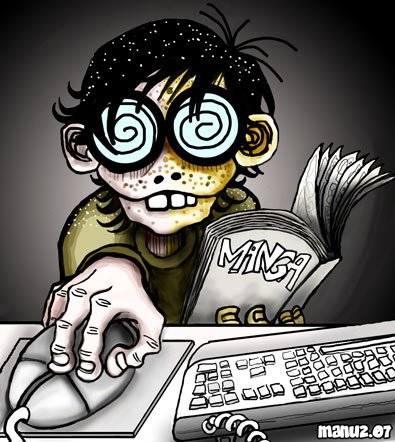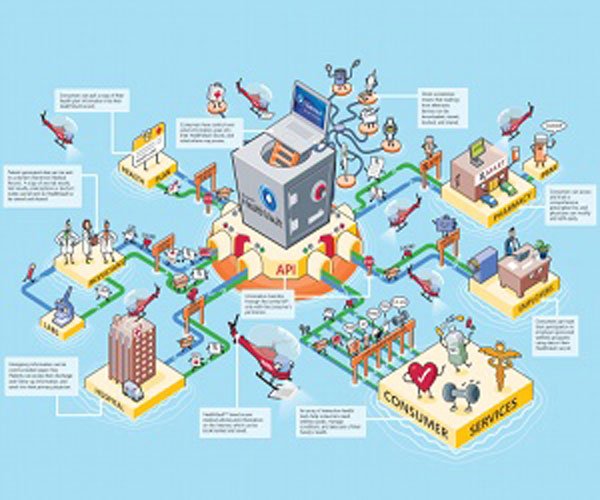NormCameron
Vista Guru
I have a confession to make: I'm pretty sure I have cancer (multiple kinds), heart palpitations, hypoglycemia, and skin tumors. I haven't talked to a real doctor about it, but Dr. Internet has helped me diagnose all of my symptoms over the last few years. (And if you think I'm trying to be funny in the first sentence, you should find out the truth from some of my friends.) This is a condition described as "cyberchondria," which Microsoft has spent time researching while trying to improve its search engine results for Live Search.
Neurotic self-diagnosis is nothing new; it was put to great comic effect in the opening pages of Jerome K. Jerome's 1889 humorous travelogue Three Men in a Boat (To Say Nothing of the Dog), for instance, in which the narrator concludes he has every disease from gout to zymosis (but not "housemaid's knee") after reading medical textbooks at the British Library.
But thinking you're about to die isn't all fun and games. Microsoft's work on cyberchondria shows how easy Internet access to medical information can really affect people. The company has just published a report on its large-scale, longitudinal, log-based study of how people search for medical information based on a 40 million page anonymized sample, combined with a survey of over 500 Microsoft employees about their own health-search experiences.
The results are much as you might expect. People like to use the Internet to better understand their symptoms, but they often find themselves digging deep into WebMD or Wikipedia before discovering—to their horror—that the tiny rash they thought they had is actually a rare skin disease that could (and likely will) kill them tomorrow.
In its report, Microsoft states the obvious—"Our results show that Web search engines have the potential to escalate medical concerns"—but notes that cyberchondria can cause post-session anxiety that can (and does) interrupt users' lives long after finishing their medical research.

It's true. I do have hypoglycemia.
Microsoft researchers Ryen White and Eric Horvitz showed several examples of different symptoms that would turn up search results for both minor and major conditions. If someone were to search for "headache," for example, there's an equal chance of finding information on caffeine withdrawal and brain tumors; the researchers note that headaches are exceedingly common, but the incidence rate of a brain tumor is around 1 in 10,000 in the US.
The same findings apply to "chest pain," which could turn out nearly equal results for indigestion and heart attacks. Here, however, the researchers are very careful to note that—although the likelihood of an otherwise healthy person having a heart attack is very low—heart disease is the leading cause of death in the US and chest pain could be an indicator of a "coronary event." And this, folks, is why people give the benefit of the doubt to Internet searches. It's always possible that you are having a heart attack.
Other parts of the report note that, once users find information on their symptoms, a third of them escalate their searches to dig deeper into serious conditions. And, when interviewing Microsoft employees about their own health-related searches, over half the group reported being disrupted in their everyday lives after learning about some remote possibility of illness from the Internet. Clearly, this is an issue that is not only causing individual stress, but could also be causing a slowdown in productivity.
At the same time, more than three-quarters of those surveyed said that the information they found online did not put them over the threshold of calling a real doctor.
Confirmed: even if dying, people are lazy.
Microsoft: "Cyberchondria" disrupting people's lives
Neurotic self-diagnosis is nothing new; it was put to great comic effect in the opening pages of Jerome K. Jerome's 1889 humorous travelogue Three Men in a Boat (To Say Nothing of the Dog), for instance, in which the narrator concludes he has every disease from gout to zymosis (but not "housemaid's knee") after reading medical textbooks at the British Library.
But thinking you're about to die isn't all fun and games. Microsoft's work on cyberchondria shows how easy Internet access to medical information can really affect people. The company has just published a report on its large-scale, longitudinal, log-based study of how people search for medical information based on a 40 million page anonymized sample, combined with a survey of over 500 Microsoft employees about their own health-search experiences.
The results are much as you might expect. People like to use the Internet to better understand their symptoms, but they often find themselves digging deep into WebMD or Wikipedia before discovering—to their horror—that the tiny rash they thought they had is actually a rare skin disease that could (and likely will) kill them tomorrow.
In its report, Microsoft states the obvious—"Our results show that Web search engines have the potential to escalate medical concerns"—but notes that cyberchondria can cause post-session anxiety that can (and does) interrupt users' lives long after finishing their medical research.

It's true. I do have hypoglycemia.
Microsoft researchers Ryen White and Eric Horvitz showed several examples of different symptoms that would turn up search results for both minor and major conditions. If someone were to search for "headache," for example, there's an equal chance of finding information on caffeine withdrawal and brain tumors; the researchers note that headaches are exceedingly common, but the incidence rate of a brain tumor is around 1 in 10,000 in the US.
The same findings apply to "chest pain," which could turn out nearly equal results for indigestion and heart attacks. Here, however, the researchers are very careful to note that—although the likelihood of an otherwise healthy person having a heart attack is very low—heart disease is the leading cause of death in the US and chest pain could be an indicator of a "coronary event." And this, folks, is why people give the benefit of the doubt to Internet searches. It's always possible that you are having a heart attack.
Other parts of the report note that, once users find information on their symptoms, a third of them escalate their searches to dig deeper into serious conditions. And, when interviewing Microsoft employees about their own health-related searches, over half the group reported being disrupted in their everyday lives after learning about some remote possibility of illness from the Internet. Clearly, this is an issue that is not only causing individual stress, but could also be causing a slowdown in productivity.
At the same time, more than three-quarters of those surveyed said that the information they found online did not put them over the threshold of calling a real doctor.
Confirmed: even if dying, people are lazy.
Microsoft: "Cyberchondria" disrupting people's lives
My Computer
System One
-
- Manufacturer/Model
- Scratch Built
- CPU
- Intel Quad Core 6600
- Motherboard
- Asus P5B
- Memory
- 4096 MB Xtreme-Dark 800mhz
- Graphics card(s)
- Zotac Amp Edition 8800GT - 512MB DDR3, O/C 700mhz
- Monitor(s) Displays
- Samsung 206BW
- Screen Resolution
- 1680 X 1024
- Hard Drives
- 4 X Samsung 500GB 7200rpm Serial ATA-II HDD w. 16MB Cache .
- PSU
- 550 w
- Case
- Thermaltake
- Cooling
- 3 x octua NF-S12-1200 - 120mm 1200RPM Sound Optimised Fans
- Mouse
- Targus
- Keyboard
- Microsoft
- Internet Speed
- 1500kbs
- Other Info
- Self built.



 , because I get really hot over both of the issues above......Does anybody know of a treatment, or indeed, is there a cure?
, because I get really hot over both of the issues above......Does anybody know of a treatment, or indeed, is there a cure? 

